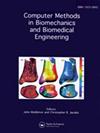Investigating the impact of feature extraction methods on prediction accuracy of neurological recovery levels in comatose patients post-cardiac arrest.
IF 1.7
4区 医学
Q3 COMPUTER SCIENCE, INTERDISCIPLINARY APPLICATIONS
Computer Methods in Biomechanics and Biomedical Engineering
Pub Date : 2025-03-10
DOI:10.1080/10255842.2025.2475466
引用次数: 0
Abstract
Cardiac arrest can cause irreversible Post-Cardiac Arrest Brain Injury (PCABI), but predicting PCABI with certainty remains challenging. This study aims to improve prognostication by predicting neurological recovery using EEG data from the 'I-CARE: International Cardiac Arrest Research Consortium Database.' Data were preprocessed with an FIR Equiripple Bandpass Filter, and three feature extraction methods were applied. Decision Tree, KNN, SVM, and Ensemble Learning algorithms were evaluated using F1-Score, Accuracy, and ROC-AUC. The highest accuracy, 0.89, was achieved with Hamming-windowed streamline feature extraction and Decision Tree after feature selection.
探讨特征提取方法对心脏骤停后昏迷患者神经恢复水平预测准确性的影响。
心脏骤停可导致不可逆的心脏骤停后脑损伤(PCABI),但准确预测PCABI仍然具有挑战性。本研究旨在通过使用来自“I-CARE:国际心脏骤停研究联盟数据库”的脑电图数据来预测神经系统恢复,从而提高预后。采用FIR等纹带通滤波器对数据进行预处理,并采用三种特征提取方法。决策树、KNN、SVM和集成学习算法使用F1-Score、准确率和ROC-AUC进行评估。采用haming窗流线特征提取和特征选择后的Decision Tree方法,准确率最高,为0.89。
本文章由计算机程序翻译,如有差异,请以英文原文为准。
求助全文
约1分钟内获得全文
求助全文
来源期刊
CiteScore
4.10
自引率
6.20%
发文量
179
审稿时长
4-8 weeks
期刊介绍:
The primary aims of Computer Methods in Biomechanics and Biomedical Engineering are to provide a means of communicating the advances being made in the areas of biomechanics and biomedical engineering and to stimulate interest in the continually emerging computer based technologies which are being applied in these multidisciplinary subjects. Computer Methods in Biomechanics and Biomedical Engineering will also provide a focus for the importance of integrating the disciplines of engineering with medical technology and clinical expertise. Such integration will have a major impact on health care in the future.

 求助内容:
求助内容: 应助结果提醒方式:
应助结果提醒方式:


